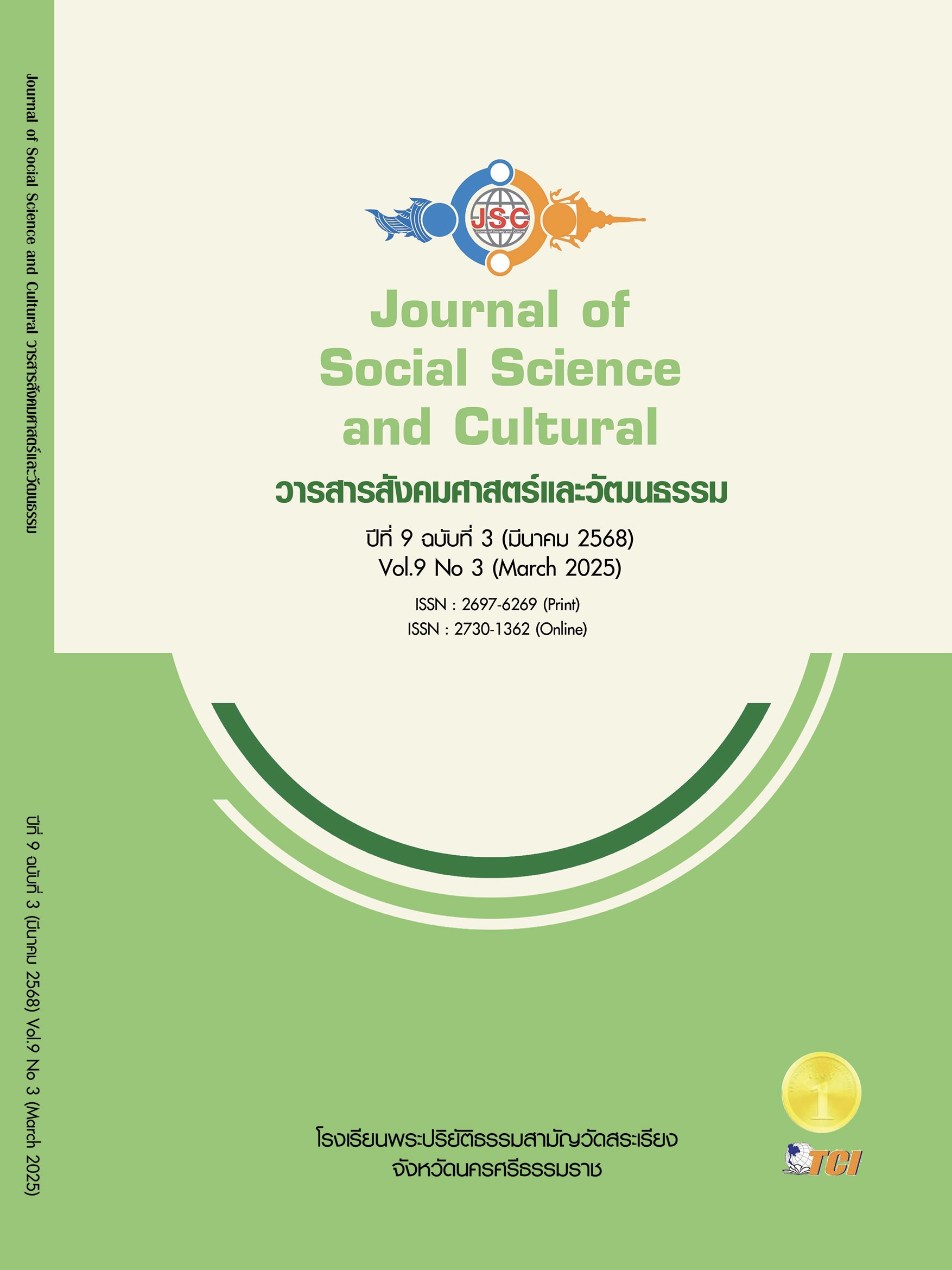A MODEL FOR DIGITAL ECONOMIC DEVELOPMENT THROUGH CULTURAL CAPITAL IN THE CONTEXT OF CULTURAL TOURISM
Main Article Content
Abstract
This research aims to study the prototype of digital economy development through cultural capital in the context of cultural tourism. The research method is qualitative. Key informants include 2 city administrators’ policy experts or government policy implementers, 2 cultural capital experts, 3 community experts, community leaders, or local community leaders, 2 tourism experts or entrepreneurs, and 2 technology experts from Nanjing and Taipei, totaling 11 people. The research instruments are in-depth interviews, structured in-depth interviews, and descriptive data analysis. The research results show that prototypes of digital economy development through cultural capital in the context of cultural tourism, such as festivals, historical sites, local foods, and handicrafts, are told in an experiential format, such as the Nanjing and Taipei Lantern Festivals, which use AR/VR technology to create participation from tourists. They also help stimulate the economy through tourism and the sale of local products, such as Nanjing Yunjin Brocade silk and Taiwanese food in night markets. The main principle is to integrate plans and teams to achieve the same goal. It is necessary to be ready in terms of digital technology and services, integrated with the cultural capital of the selected cities, and presented to tourists according to the set goals. This action plan will be successful through the integration of all elements from government agencies and cooperation from the government, private sector and community through tangible measurement and evaluation.
Article Details
References
กระทรวงการท่องเที่ยวและกีฬา. (2566). รมว.ท่องเที่ยวและกีฬา มอบนโยบายกระทรวงการท่องเที่ยวและกีฬา. เรียกใช้เมื่อ 23 ตุลาคม 2566 จาก https://www.mots.go.th/news/1000596
นพรัตน์ สัจจะวิสัย. (2558). การจัดการความรู้เกี่ยวกับภูมิปัญญาท้องถิ่นด้านหัตถกรรมของเทศบาลเมืองต้นเปา อำเภอสันกำแพง จังหวัดเชียงใหม่. ใน วิทยานิพนธ์รัฐประศาสนศาสตรมหาบัณฑิต สาขาวิชารัฐประศาสนศาสตร์. มหาวิทยาลัยเชียงใหม่.
ผู้ให้ข้อมูลหลัก รหัส C001. (3 ส.ค. 2567). ทุนทางวัฒนธรรมที่เป็นรากฐานของการท่องเที่ยวเชิงวัฒนธรรม, การมีส่วนร่วมของชุมชนในการพัฒนาและส่งเสริมการท่องเที่ยวเชิงวัฒนธรรม, การพัฒนาโครงสร้างพื้นฐานดิจิทัลเพื่อสนับสนุนการท่องเที่ยวเชิงวัฒนธรรม. (ประยุทธ ตั้งสงบ, ผู้สัมภาษณ์)
ผู้ให้ข้อมูลหลัก รหัส C002. (28 ส.ค. 2567). ทุนทางวัฒนธรรมที่เป็นรากฐานของการท่องเที่ยวเชิงวัฒนธรรม, การบูรณาการเศรษฐกิจดิจิทัลกับการพัฒนาการท่องเที่ยวเชิงวัฒนธรรม, การพัฒนาโครงสร้างพื้นฐานดิจิทัลเพื่อสนับสนุนการท่องเที่ยวเชิงวัฒนธรรม, นโยบายและการสนับสนุนจากภาครัฐสำหรับเศรษฐกิจดิจิทัล. (ประยุทธ ตั้งสงบ, ผู้สัมภาษณ์)
ผู้ให้ข้อมูลหลัก รหัส C003. (10 ส.ค. 2567). การมีส่วนร่วมของชุมชนในการพัฒนาและส่งเสริมการท่องเที่ยวเชิงวัฒนธรรม, การมีส่วนร่วมของชุมชนในการพัฒนาและส่งเสริมการท่องเที่ยวเชิงวัฒนธรรม, การบูรณาการเศรษฐกิจดิจิทัลกับการพัฒนาการท่องเที่ยวเชิงวัฒนธรรม, การพัฒนาโครงสร้างพื้นฐานดิจิทัล. (ประยุทธ ตั้งสงบ, ผู้สัมภาษณ์)
ผู้ให้ข้อมูลหลัก รหัส C005. (10 ต.ค. 2567). ทุนทางวัฒนธรรมที่เป็นรากฐานของการท่องเที่ยวเชิงวัฒนธรรม. (ประยุทธ ตั้งสงบ, ผู้สัมภาษณ์)
ผู้ให้ข้อมูลหลัก รหัส C006. (29 ส.ค. 2567). การมีส่วนร่วมของชุมชนในการพัฒนาและส่งเสริมการท่องเที่ยวเชิงวัฒนธรรม, การบูรณาการเศรษฐกิจดิจิทัลกับการพัฒนาการท่องเที่ยวเชิงวัฒนธรรม, การบูรณาการเศรษฐกิจดิจิทัลกับการพัฒนาการท่องเที่ยวเชิงวัฒนธรรม, การพัฒนาโครงสร้างพื้นฐานดิจิทัลเพื่อสนับสนุนการท่องเที่ยว. (ประยุทธ ตั้งสงบ, ผู้สัมภาษณ์)
ผู้ให้ข้อมูลหลัก รหัส T001. (22 ก.ย. 2567). ทุนทางวัฒนธรรมที่เป็นรากฐานของการท่องเที่ยวเชิงวัฒนธรรม, การมีส่วนร่วมของชุมชนในการพัฒนาและส่งเสริมการท่องเที่ยวเชิงวัฒนธรรม, การบูรณาการเศรษฐกิจดิจิทัลกับการพัฒนาการท่องเที่ยวเชิงวัฒนธรรม, การพัฒนาโครงสร้างพื้นฐานดิจิทัลเพื่อสนับสนุนการท่องเที่ยว. (ประยุทธ ตั้งสงบ, ผู้สัมภาษณ์)
ผู้ให้ข้อมูลหลัก รหัส T002. (17 ส.ค. 2567). ทุนทางวัฒนธรรมที่เป็นรากฐานของการท่องเที่ยวเชิงวัฒนธรรม, การมีส่วนร่วมของชุมชนในการพัฒนาและส่งเสริมการท่องเที่ยวเชิงวัฒนธรรม, การพัฒนาโครงสร้างพื้นฐานดิจิทัลเพื่อสนับสนุนการท่องเที่ยวเชิงวัฒนธรรม, นโยบายและการสนับสนุนจากภาครัฐสำหรับเศรษฐกิจดิจิทัล. (ประยุทธ ตั้งสงบ, ผู้สัมภาษณ์)
ผู้ให้ข้อมูลหลัก รหัส T003. (22 ก.ย. 2567). การมีส่วนร่วมของชุมชนในการพัฒนาและส่งเสริมการท่องเที่ยวเชิงวัฒนธรรม, การมีส่วนร่วมของชุมชนในการพัฒนาและส่งเสริมการท่องเที่ยวเชิงวัฒนธรรม, นโยบายและการสนับสนุนจากภาครัฐสำหรับเศรษฐกิจดิจิทัลในบริบทการท่องเที่ยว. (ประยุทธ ตั้งสงบ, ผู้สัมภาษณ์)
ผู้ให้ข้อมูลหลัก รหัส T004. (29 ก.ย. 2567). ทุนทางวัฒนธรรมที่เป็นรากฐานของการท่องเที่ยวเชิงวัฒนธรรม, การบูรณาการเศรษฐกิจดิจิทัลกับการพัฒนาการท่องเที่ยวเชิงวัฒนธรรม, นโยบายและการสนับสนุนจากภาครัฐสำหรับเศรษฐกิจดิจิทัลในบริบทการท่องเที่ยว. (ประยุทธ ตั้งสงบ, ผู้สัมภาษณ์)
ผู้ให้ข้อมูลหลัก รหัส T005. (10 ต.ค. 2567). ทุนทางวัฒนธรรมที่เป็นรากฐานของการท่องเที่ยวเชิงวัฒนธรรม, การบูรณาการเศรษฐกิจดิจิทัลกับการพัฒนาการท่องเที่ยวเชิงวัฒนธรรม, การพัฒนาโครงสร้างพื้นฐานดิจิทัลเพื่อสนับสนุนการท่องเที่ยวเชิงวัฒนธรรม. (ประยุทธ ตั้งสงบ, ผู้สัมภาษณ์)
พัชราภรณ์ คชินทร์ และเชิดชัย อุดมพันธ์. (2565). วาทกรรมการท่องเที่ยวในนิตยสารเพื่อการท่องเที่ยวของไทย. ใน ดุษฎีนิพนธ์ปรัชญาดุษฎีบัณฑิต สาขาวิชาภาษาไทย. มหาวิทยาลัยสงขลานครินทร์.
รัฐบาลไทย. (2566). 21 ปี กระทรวงวัฒนธรรม “เสริมศักดิ์” มอบนโยบาย“วัฒนธรรมนำเศรษฐกิจ”พร้อมสืบสาน รักษา ต่อยอด ขับเคลื่อน 10 นโยบายรองรับ THACCA ดัน 10 นโยบาย Soft Power สร้างเสน่ห์วิถีไทย. เรียกใช้เมื่อ 28 ตุลาคม 2566 จาก https://www.thaigov.go.th/news/contents/details/72941
สำนักงานผู้บริหารเทคโนโลยีสารสนเทศระดับสูง อว. (2566). แผนพัฒนารัฐบาลดิจิทัลของประเทศไทย พ.ศ. 2566-2570. เรียกใช้เมื่อ 28 ตุลาคม 2566 จาก https://cio.mhesi.go.th/node/4149
สุภางค์ จันทวานิช. (2559). วิธีการวิจัยเชิงคุณภาพ. (พิมพ์ครั้งที่ 23). กรุงเทพมหานคร: สำนักพิมพ์แห่งจุฬาลงกรณ์มหาวิทยาลัย.
Jin, X. et al. (2024). Exploring digital innovation in smart tourism destinations: insights from 31 premier tourist cities in digital Chin. Retrieved October 10, 2024, from https://www.semanticscholar.org/paper/Exploring-digital-innovation-in-smart-tourism-from-Xu-Shi/f3852f9d29018f57aecf74002bd9deae706adfc2
Kasemsarn, K. (2017). A framework for inclusive digital storytelling for cultural tourism in Thailand. Retrieved October 7, 2024, from https://www.semanticscholar.org/paper/A-framework-for-inclusive-digital-storytelling-for-Kasemsarn/eda4538ae6d2dfabe46efb4b1c6a88f8ecb38b12
Ma, L. et al. (2021). valuation of Tourism Developing Level of Yangtze Delta Cities Basing on Analytic Hierarchy Process Analysis and Clustering Analysis. Retrieved November 10, 2024, from https://www.scirp.org/journal/paperinformation?paperid=107101
Maags, C. (2021). Common, Luxury, and Fake Commodities: Intangible Cultural Heritage Markets in China. Retrieved October 7, 2024, from https://journals.openedition.org/chinaperspectives/12184
Manajit, S. et al. (2024). Exploring the Potential Synergy Between Disruptive Technology and Historical/Cultural Heritage in Thailand's Tourism Industry for Achieving Sustainable Development in the Future. International Journal of Tourism Research, 26(5), e2759.
Peng, R. & Chang, J. (2023). Innovative Development Strategies for “Immersive” Cultural and Tourism Night Tours from a Metaverse Perspective. Academic Journal of Business & Management, 5(8), 58-63.
Radio Taiwan Intl. (2566). เดือน เม.ย.ปีนี้ ไต้หวันมีจำนวนประชากรรวมทั้งหมด 23,347,374 คน จำนวนเด็กเกิดใหม่ลดลงต่ำกว่าหลักหมื่น. เรียกใช้เมื่อ 20 กันยายน 2566 จาก https://th.rti.org.tw/news/view/id/2007023
Sapu, S. & Aphathanakorn, A. (2024). Digital learning platform for cultural heritage: new normal tourism for community. Retrieved October 7, 2024, from http://emerald.com/insight/content/doi/10.1108/jchmsd-09-2022-0153/full/html)
Xiuli, J. et al. (2021). Digital Application of Intangible Cultural Heritage from the Perspective of Cultural Ecology. Retrieved October 7, 2024, from https://smarttourism.khu.ac.kr/file/202103/1622686912.pdf
Yueh-Cheng, W. et al. (2020). Cultural tourism and temples: Content construction and interactivity design. Retrieved October 10, 2024, from https://www.sciencedirect.com/science/article/abs/pii/S0261517719301700


